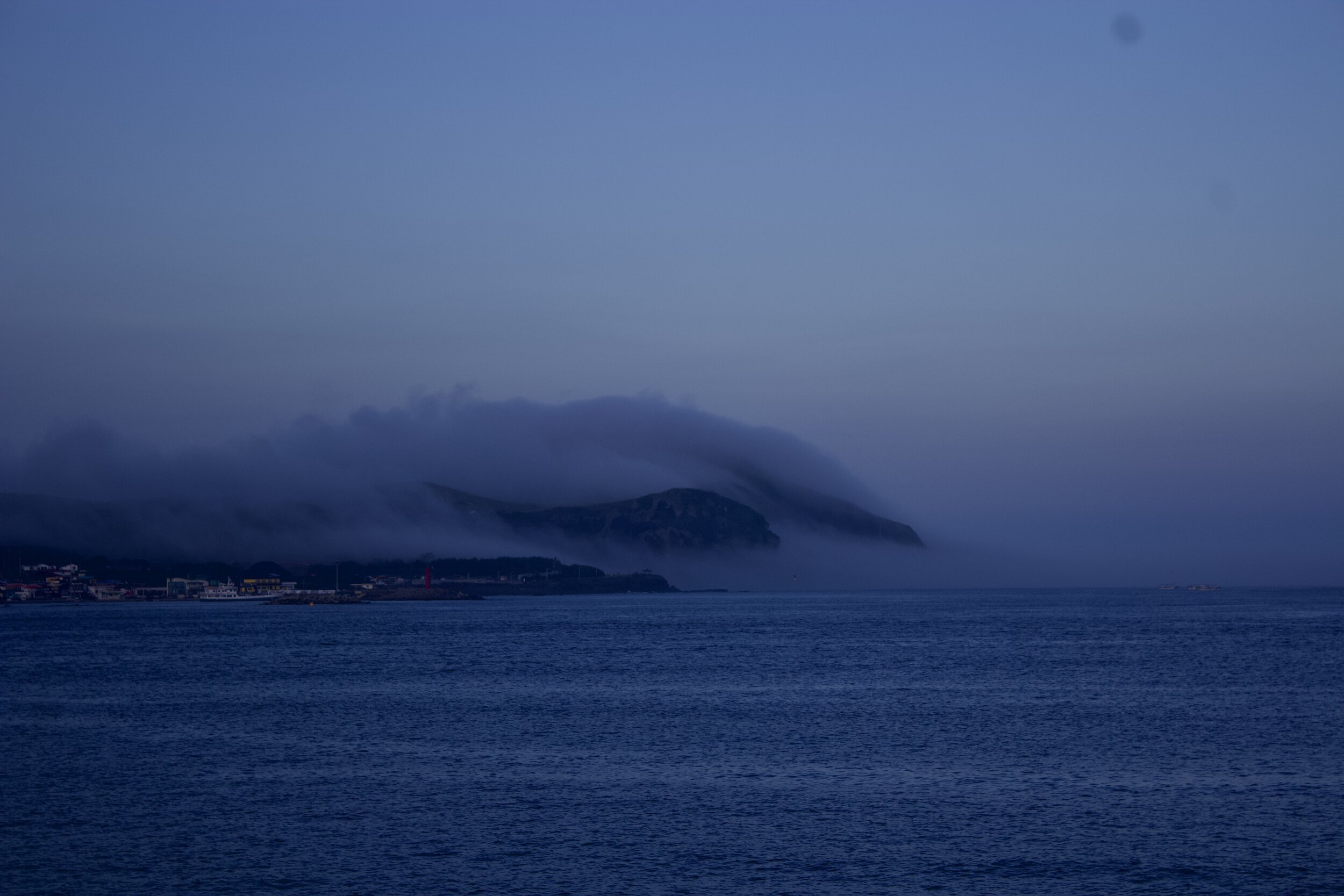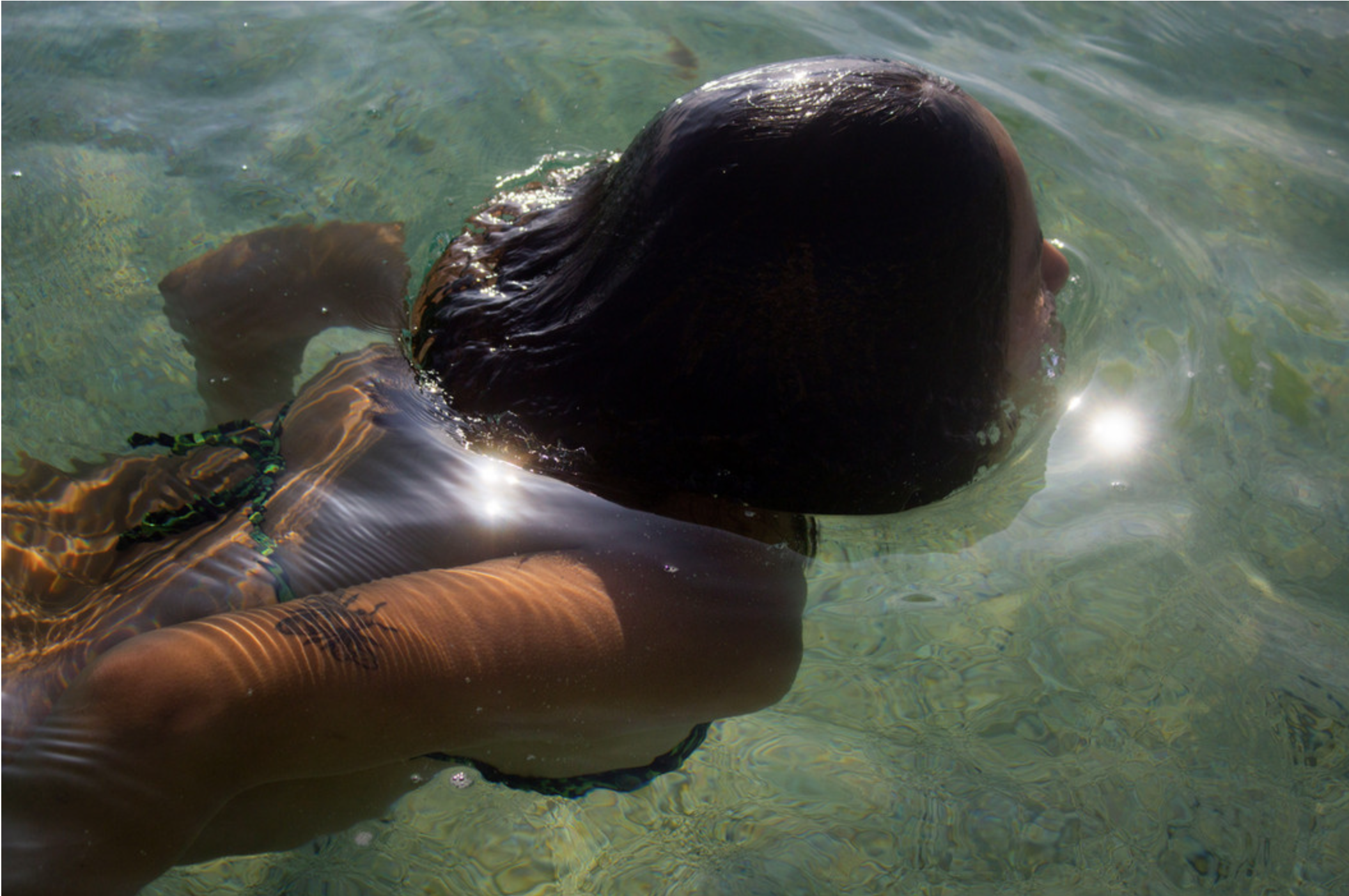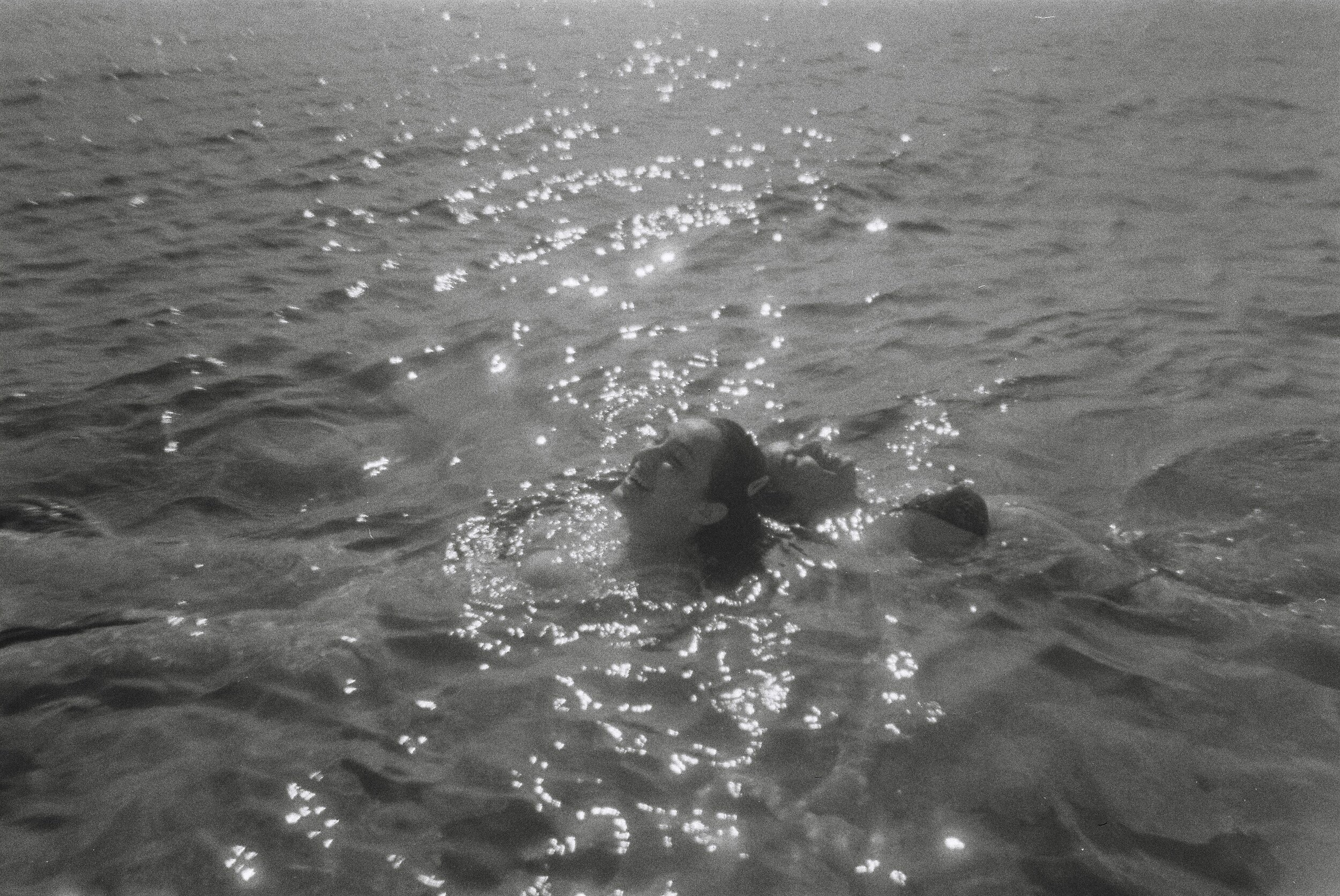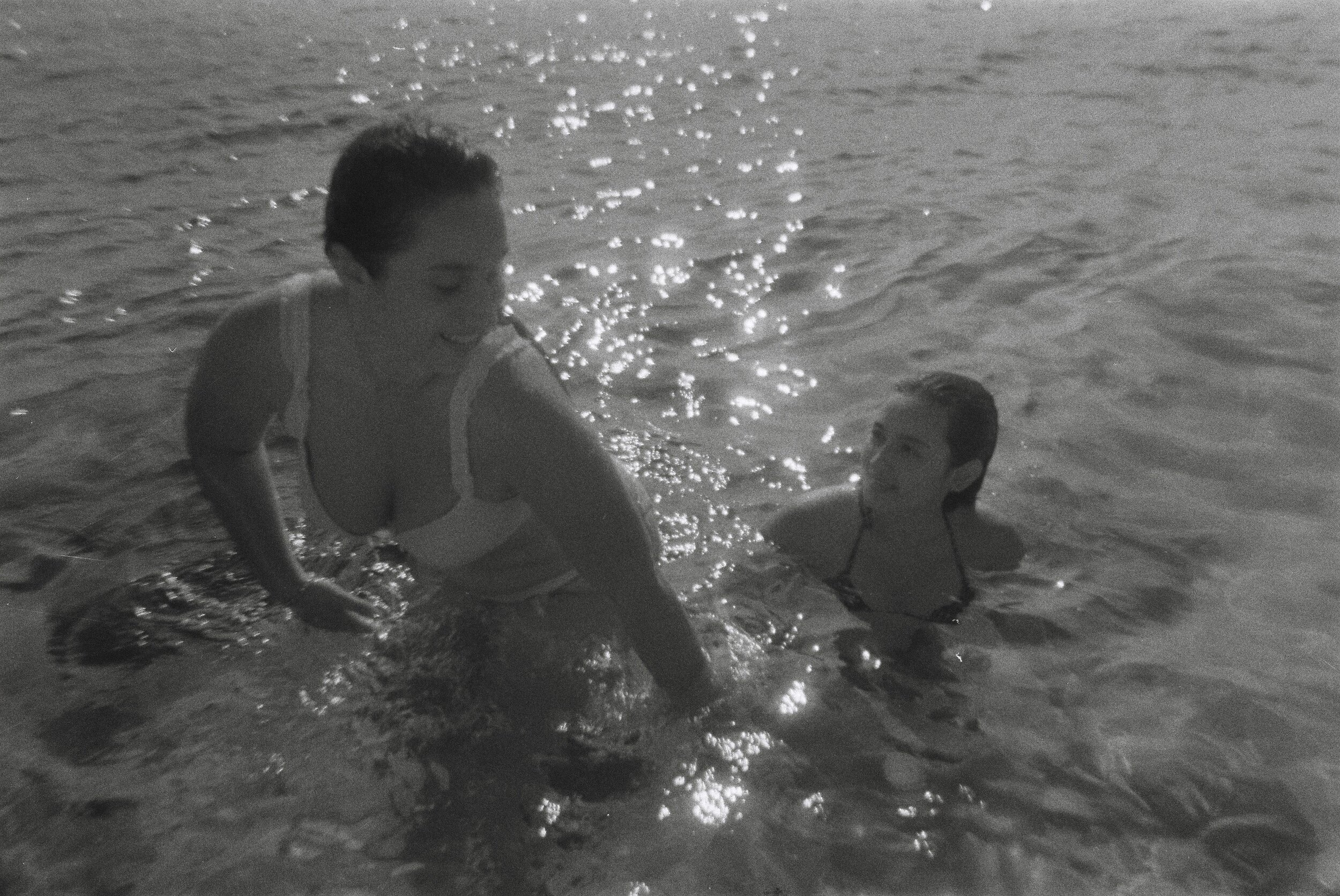Snapshot: Summering on Jeju Island
Udo in the evening as we road the boat back to Jeju Island.
Amber and I are running. We narrowly avoid duffel bags and ambling bodies, rushing past oncoming travelers. Despite the rush, I’m laughing. I look over at Amber, my coworker and closest friend in Seoul, and she’s laughing too. Our plane is about to take off in five minutes and people are staring. It’s our first time at Gimpo Airport. Turns out there’s another terminal for flights to Jeju, Korea’s largest and most popular island for summer vacationing. Embarrassingly, it takes us an hour to realize that the absence of travelers and even workers is a sign that we are in the wrong place. Our taxi driver probably saw two foreign girls, figured we were boarding international rather than domestic, and dropped us off at the wrong terminal. With twenty minutes left until final boarding, we manage to call another taxi, get through security, retrieve our tickets, and dash like mad women to our gate. After months of never-ending assignments and late nights at the office, the idea of escaping from mainland Korea is enticing but seems too good to be true. At least, that’s what I think until we narrowly slip past the closing gate and board our flight.
As we fly over Korea, I close my eyes and dwell over the past five months. While living in Seoul has been one of the most exciting and fulfilling experiences of my life, it was unbearably overwhelming. Growing up, I imagined a life untethered to any single place. I promised myself I would live in different cities and meet new people, unknowingly consigning myself to never being content anywhere. However, when I turned 24, I realized that I was stuck in a mundane routine. My days consisted of school, work, and home. It was the first time I realized I was more comfortable dreaming about the life I wanted rather than making it happen. That inspired panic. On a whim, I applied to a teaching position in Seoul. As soon as I knew it, I was contracted to move to Korea that upcoming February. I arrived at Incheon airport without any ability to speak Korean or read Hangul. I knew absolutely no one and signed a contract for a job I had no experience in. Work was overbearing at times. If it was demanding in ways that made sense instead of nonsensical and inefficient, then stress is nothing with which I’m unaccustomed. At work, it seemed like I couldn’t do anything right. At the time, I didn’t know it but one of my coworkers who I considered a friend had been dissuading others from befriending me, an unsuccessful attempt at cornering me into social isolation. To this day I can’t trace the root of her malice.
Udo Island from afar. Udo means cow. Allegedly, it's named after the bumps that look like a cow lying down.
A few weeks after my move, my grandmother passed away and I stumbled through the grief alone. The time difference made it difficult to talk to family during the week. Often, I watched my coworkers go out to dinner or explore on weekends. I waited for a text or a knock on the door but it never came. I couldn’t even make small talk at the corner store or a coffee shop. Those weeks left me feeling ghostly. It was as if I was a shadow existing in small, inconsequential spaces. My home was no longer Tampa but my home didn’t exist in Seoul either. The only things that felt close to the concept were the FaceTime calls to my parents and sister. Home was suddenly this intangible thing, encompassing time instead of a place. This left me feeling untethered.
So when we finally landed on Jeju, I felt like I could finally breathe.
We take a taxi to Iho Tewoo Beach, a 15-minute ride from the airport. We drag our luggage through the sand and strip out of our clothes, bikinis ready underneath. To avoid tanning, most Koreans are fully clothed at the beach, even donning large hats and glasses to shield their faces. For this reason, we’re the only half-naked people around. The sky is a bit cloudy, so the water isn’t as picturesque as the pictures online. However, it feels no less comforting to swim in. There is nothing more healing than saltwater. Where my tears hadn’t been enough, the ocean water is plentiful. After a while, the clouds clear above and suddenly the sun is blinding. The water turns from dark wine to liquid glass in an instant. We swim around each other taking pictures on our point and shoots. After thoroughly burning all of our skin, we put our clothes back on and trudge down the street to a local restaurant. We eat salted fish, banchan, rice, and drink beer. Halfway through my meal, I realize my muscles haven’t been as relaxed in months as they are at this moment.
Amber swimming at Seobinbaeksa Beach.
A few weeks later, I learn that the same coworker from before had been hard at work planting seeds of doubt into our trip. How Amber and I didn’t know how expensive Jeju would be. How my friendship with Amber would fall apart at four days of close quarters. How I was bad at budgeting my money, an idea this coworker formed when the last bits of my paycheck were spent on grief counseling at the end of one month. “I would hate to see you pay for everything,” she had said to Amber, a fake show of concern. As if I had any history of taking money from her or anyone else. In reality, it was jealousy. Originally, she was someone Amber and I considered a good friend. She was meant to join us on the trip until work interfered with her time off. She couldn’t stand the idea of us going without her. Instead, she would whisper in Amber’s ear about how I was a mooch and irresponsible with my money. Then she would come to me about how cheap and stingy Amber was. In the end, those ideas failed to sprout, withering to nothing.
Instead, Amber and I go to a wine bar. We drink two bottles of wine, a start of a tradition and something of a covenant between the two of us. We share secrets. I tell her things I have only told to those with which I share a decade of friendship. At one point, we cry together. In the end, when we both have two glasses of wine left of our second bottle, we concur that things are easy between us. The conversation comes naturally and we are often in sync when we wander. We form trust that comes without doubt, something we couldn’t find with others in Seoul. It is an agreement that some friendships matter more than others.
The next day our friend and coworker Monique arrives onto the island. She was supposed to fly with us but instead had canceled her ticket the night before to finish all of her assignments at work. She found a last minute ticket for the next day and joined us. Monique meets us at Jeongbang Waterfall, famous for its direct drop into the East China Sea and a legend that a holy dragon lives underneath the blanket of its drop. This is the closest I have ever come to a waterfall in my life. We walk down a bridge of jagged rocks, wet and slick, to stand in the path of its current. The sun is heavy above but the mist from the falls is an ice-cold spray. A few meters away are haenyeo, a group of famous female free divers on Jeju that are symbolic of the island's semi-matriarchal structure. On rocks under the cover of a makeshift tent, they count their spoils composed of mollusks and seaweed. After we trek back up the path to the top of the falls, an old woman takes a brief glance and informs us we needed Hallabong juice. She’s right. It’s the best orange juice any of us have ever had. It comes in a bear-shaped bottle with a fragrant tangy but sweet flavor. The moment is just as sweet, a testament to perseverance and how such beautiful moments can come after prolonged, denied hurt.
Jeongbang Waterfall from the steps leading down to it.
We spend the rest of our days exploring. Monique, Amber, and I find each other’s company easy. We climbed Mt. Hallasan, Korea’s tallest mountain and volcano. It takes eight hours total. At one point, we think we’ll die of exhaustion. We walk up and then down on a pathway made of jutting rocks. We walk and walk and still can’t reach the end. Then, we start to get dizzy. I think I hallucinate the sight of Roe Deers only to find that they’re real. It boggles my mind how the local elderly Koreans make the trek easily as do the children accompanying their parents. For us, it’s torture. For them, it’s a fun, weekend excursion. Our eventual arrival at the top justifies our celebratory feast that night. We gorge on Korean BBQ with extra orders of meat and rice. We melt squares of mozzarella cheese on the grill to pack onto our food. Our bodies fail us in the morning.
The next day, we limp to the Hwanguji natural pools. Again, we are the only ones in bikinis, and while people do stare in passing, it’s brief and inoffensive. The water is trapped in a tide pool: cold, clear, and refreshing. It feels good on our sore muscles. An old lady sits on the jagged rocks drinking a beer. She crushes the can in her hand. Another woman swims away from her family. She comes to me and hands me her goggles. She tells me to use them to see underwater. With them, I dive under the waves and see families of fish beneath us. The rocks underneath are a testament to the volcanic birth of this island refuge. When I resurface, I try to find the woman again but there are too many people. The interaction leaves me warm and light. After a fruitless attempt at drying in the sun, we walk up soaking wet to the main road. It’s a simple climb up a wooden staircase that is torturous due to our damaged muscles from the hike. Still, I have never felt so much and seen so much, all at once. For a long time, I had been stuck in a confining routine, afraid to step outside my comfort zone. At this moment, I feel like I’m living for the first time.
Amber and I swimming at Seobinbaeksa Beach on Udo Island. Monique took the picture on my point and shoot.
The next day we head to Udo, a smaller island off the coast of Jeju. Udo is similar to Jeju but sparser, with rolling hills, farm land and bluffs. We rent motorbikes and ride on the empty, dirt roads. It takes us 15 minutes to get to the middle of the island. A white, post-modern building stands among green tea and rice paddies. The food is the best I’ve had so far, which is surprising considering how good food is in Korea. It’s a bowl of thick tomato soup with udon noodles and tempura shrimp. The soup is warm, hearty and filling. My muscles still ache from the mountain but I feel renewed. It’s as if I had to break myself down further to begin building myself back up. We decided to ride to Jimmy’s, an ice cream shop that claims to sell the most famous peanut ice cream on the island. The man who owns the shop christens us with new names: California, Florida, and Texas. We stare out over the bluffs from the second story. There’s a boat swimming in donuts and colorful motorcars underneath.
We fantasize about staying on the island and never returning to our jobs in Seoul. We resolve to move to Jeju once our contracts are over, though we know it will never happen. It’s nice to have a joint fantasy. We take off with sticky fingers to our last stop, Seobinbaeksa. It’s a rocky stretch of beach with water that rivals the Amalfi Coast. This time, we see more people in bikinis. The water is freezing but there’s something refreshing about ice-cold water on a hot day. I would like to stay here forever but it was almost time to return our rented motorbikes. I’m learning that some things are better when they are brief and fleeting. Whether it’s with the freezing waves or a smooth gust of wind, I briefly imagine what it would be like to turn to dust and float free. I think of my grandmother in these moments. When she visits me in these happy moments, the wind feels like her caress and the lapping waves her embrace. I’m surrounded by friends and fresh air. For once, everything is enough.
STORY EDA SELIN MANER





